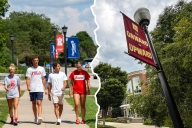You have /5 articles left.
Sign up for a free account or log in.

The Supreme Court’s affirmative action ruling has colleges tiptoeing through a potential legal minefield, but some say too much caution could unnecessarily hurt students of color.
Photo illustration by Justin Morrison/Inside Higher Ed
The dust was still settling from the Supreme Court’s ruling against affirmative action when, less than a week later, around 300 students of color at Western Illinois University got an unexpected email from the university: a $1,000 scholarship they’d been promised just months early would no longer be available.
The Justice, Inclusion, Diversity and Equity (JIDE) scholarship had been exclusively open to students of color, according to an archived webpage describing the requirements. It had been eliminated, the university explained, because its race-specific qualifications could put the university in violation of the Supreme Court decision.
Students’ frustration was short-lived. A few weeks later, WIU reversed the decision, reinstating the scholarship for the incoming cohort and flip-flopping on a decision that would have had profound effects on students’ financial access to the institution.
Alisha Looney, WIU’s interim assistant vice president of communications, said via email that university administrators originally decided to eliminate the scholarship because they believed it would eventually be a legal casualty of the ruling. It hasn’t been added back to the university’s website for the same reason.
“Changes will likely need to be made to the scholarship to align with the law, and we originally did not want to bring students to Western with the promise of a scholarship that we could not guarantee past this first semester,” Looney wrote. “However, after careful consideration and communication, we have decided to offer this to the students this semester with the goal of continuing to improve and modify our financial aid package to best serve our students.”
The university’s position on race-conscious scholarships goes beyond the explicit scope of the Supreme Court’s decision, which only specifically mentions admissions. The full implications of the ruling remain the subject of heated discussion, but some worry that colleges are jumping to conclusions.
Shaun Harper, director of the University of Southern California’s Race and Equity Center, said when those fears drive decision-making, underprivileged students of color—like the WIU students who temporarily lost their scholarships—stand to lose the most.
“Colleges will convince themselves there’s a real risk of losing federal funding if they are seen as being in any danger of violating the Supreme Court ruling,” he said. “That’s not a thing that happens. But it is a boogeyman. And when [colleges] are unnecessarily careful, it can lead to a betrayal of the institution’s espoused commitments to diversity, equity and inclusion.”
Overcorrection or Opportunism?
James Murphy, deputy director of higher education policy for Education Reform Now, said in the absence of strong federal guidance, more institutions are likely to make the kind of defensive decisions that WIU made, and that the seesawing is indicative of the general air of panicked confusion taking hold.
“Many universities are going to be in their position, particularly smaller private and regional public institutions that don’t have a lot of institutional or legal resources … As civil rights complaints pour in and the doors open wider, colleges feel less safe. And so what are they going to do? They’re going to be very conservative, very risk averse,” he said. “I think that as bad as the decision was, it will get much, much worse if colleges overcorrect.”
Murphy plays a central role in this story. He was contacted by a friend, a high school guidance counselor, who spotted WIU’s announcement about the scholarship in a Facebook group where the parents of some affected students were posting about their frustration with the decision. Murphy sent the notice to WBEZ in Chicago; WIU, after receiving questions from the station, said the scholarship would be reinstated for the incoming cohort.
Interestingly, the university did not wait until July 5 to anticipate the Supreme Court ruling’s effects on scholarships; it didn’t even wait for the court to rule. Administrators removed the JIDE scholarship and application from the university’s website on June 15, nearly two weeks before the decision was handed down, according to archived versions on the Wayback Machine.
When asked about this apparent discrepancy, Looney said WIU had predicted a negative outcome for affirmative action and so pulled it pre-emptively.
“We, of course, anticipated the decision that was coming from the Supreme Court,” she said. “We did not stop awarding the scholarship, but we did stop promoting it in case we decided to remove it based on the court decision.”
WIU has not, however, eliminated another scholarship available exclusively to applicants with alumni relatives.
Murphy said he’s worried that there’s more than legal caution motivating institutions to consider eliminating race-based scholarships and other programs. It presents a unique opportunity, he said, for colleges to make spending cuts while laying the blame on an unpopular and distant antagonist in the form of the Supreme Court.
“Diversity is expensive, and the reality is that outside of maybe a few hundred institutions in America, most colleges are operating year to year, maybe even month to month, to survive,” he said. “I fear that one of the one of the ill effects of this—and Western Illinois could be an early case—will be institutions saying, ‘The Supreme Court said we can’t do this anymore so we’re going to trim that for the budget,’ even though there’s no nothing in the decision that says they have to.”
Looney said WIU won’t make a final decision on its JIDE scholarship until the federal Department of Education releases guidance on the court’s ruling. The department promised resources for institutions on the day the Supreme Court handed down its ruling, saying in a June 29 press release that guidance should be expected within 45 days, putting the deadline at less than a week from now.
But Murphy is not confident the department will offer much in the way of concrete guidance.
“It is going to be incredibly important for them to provide clarity on this particular issue,” he said. “I do not know that they’re going to, to be frank.”
Preparing for a Litigative Onslaught
WIU is far from alone in taking or considering more sweeping, proactive measures on race-conscious policies.
A few hours after the ruling was passed down on June 29, the Missouri attorney general, Andrew Bailey, issued an order interpreting its scope as going far beyond admissions, into scholarships and hiring; the University of Missouri promptly responded by eliminating the consideration of race in some of its scholarships upon the recommendation of its legal counsel.
The University of Kentucky appeared to take the same reading of the decision. Shortly after the ruling, university president Eli Capilouto wrote in a statement to students and faculty that “based on our initial understanding, it appears that the Court has restricted the consideration of race with respect to admissions and scholarships.”
When asked whether the university has reached a final understanding of the ruling’s bearing on scholarships, university spokesperson Jay Blanton said that current scholarship recipients were not affected but that in the future “UK intends to be fully compliant with the law.”
“To the extent that we make changes as part of our efforts to be compliant, we will communicate directly with students and families,” Blanton wrote in an email. “We are taking this step by step to that end.”
William Jacobson, a law professor at Cornell University and the founder and director of the conservative legal nonprofit Equal Protection Project, said that in his view the affirmative action ruling goes far beyond admissions, a position shared by many conservative lawmakers and governing board members. Institutions, he believes, are right to cast a wide net to avoid future lawsuits, which he predicts will flow freely now that the dam has been breached.
“A core philosophy advanced by campus Diversity, Equity, and Inclusion ideology has been rejected as unlawful. Those in higher education who try to pigeonhole the ruling into university admissions are missing the sweep and scope of the equal protection ruling,” Jacobson said via email. “The days when universities could get away with racial discrimination to advance diversity are over. Higher ed needs to adjust across the board.”
Pressure on institutions to make those adjustments is already ramping up. On Monday, Jacobson’s EPP filed a civil rights complaint against a residency program for Black filmmakers at the University of Nebraska at Lincoln. And a case against Wisconsin’s Higher Education Aids Board over race-based scholarships, dismissed in 2022, is moving forward to a potential appeal in light of the affirmative action ruling.
Harper said institutions should be more concerned about the students of color who stand to lose support or access than the possibility of future liability. The fact that they sometimes don’t appear to be, he added, may be a reflection of the priorities of institutional leaders.
“Institutions that truly want a racially diverse student body will find many legal ways to pursue that,” Harper said. “There’s very little diversity, racial and ethnic diversity in the legal departments or among legal counsel. I think that those white lawyers tend to be so overly careful because of their lack of experiential proximity to the issue.”

.jpg?itok=KekgzrtI)







